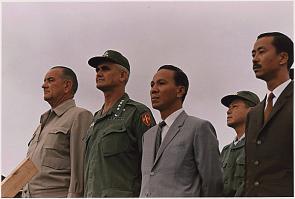Vietnam War Resources from the Gilder Lehrman Institute
Posted by Anna Khomina on Friday, 09/15/2017
This Sunday, September 17, marks the premiere of The Vietnam War, a ten-part, 18-hour documentary series by Ken Burns and Lynn Novick that takes a multifaceted look at one of America’s most divisive and controversial conflicts. Prepare for the series by building up your Vietnam-era background knowledge with scholarly essays, primary source documents, teaching tools, and videos from our website:
Video: The Origins of the Vietnam War
In this video lecture, National Security Archive senior fellow John Prados discusses the factors that led to the Vietnam War.
 Infographic: The Vietnam War: Military Statistics
Infographic: The Vietnam War: Military Statistics
An infographic shows the number of deployed US military forces and casualties from 1964 to 1972.
Featured Primary Source: Robert F. Kennedy to John Bayliss, 1967
In this September 15, 1967, letter Senator Robert F. Kennedy states that the government’s goal in Vietnam "is to protect the right of the South Vietnamese to be able to govern themselves."
Essay: The First Saddest Day of My Life: A Vietnam War Story
Sharon D. Raynor takes readers through the Vietnam War diary of her father, Louis Raynor, who was drafted at age eighteen and served in Vietnam from 1967 to 1969.
Essay: The Vietnam War and the My Lai Massacre
George Herring, professor of history emeritus at the University of Kentucky, looks at the events and legacy of the 1968 My Lai and My Khe massacres, in which US soldiers killed more than 400 Vietnamese civilians.
 Essay: The Consequences of Defeat in Vietnam
Essay: The Consequences of Defeat in Vietnam
Mark Atwood Lawrence, associate professor of history at the University of Texas at Austin, investigates why the US government, while exploring military tactics for fighting the Vietnam War, failed to assess the possibility and consequences of a defeat.
Featured Primary Source: Edward Kennedy on conscience, resistance, and reconciliation at the end of the Vietnam War, 1973
In a letter written after the Paris Peace Accords officially ended US involvement in Vietnam, Senator Kennedy discusses the need to care for those who served in Southeast Asia and to turn "attention to reconciliation and healing the wounds and bitterness created by this long and costly conflict."
Lesson Plan: The End of the Vietnam War: Conscience, Resistance, and Reconciliation
In this two-lesson unit, students use primary source documents to explore the moral and political arguments of the post-war debate over pardons for draft evasion.
Essay: Vietnam Veterans Memorial
In this excerpt from Maya Lin’s Boundaries, the designer and artist reflects on the symbolism and significance of her winning design for the Vietnam Veterans Memorial in Washington DC, and what meaning it holds for her.